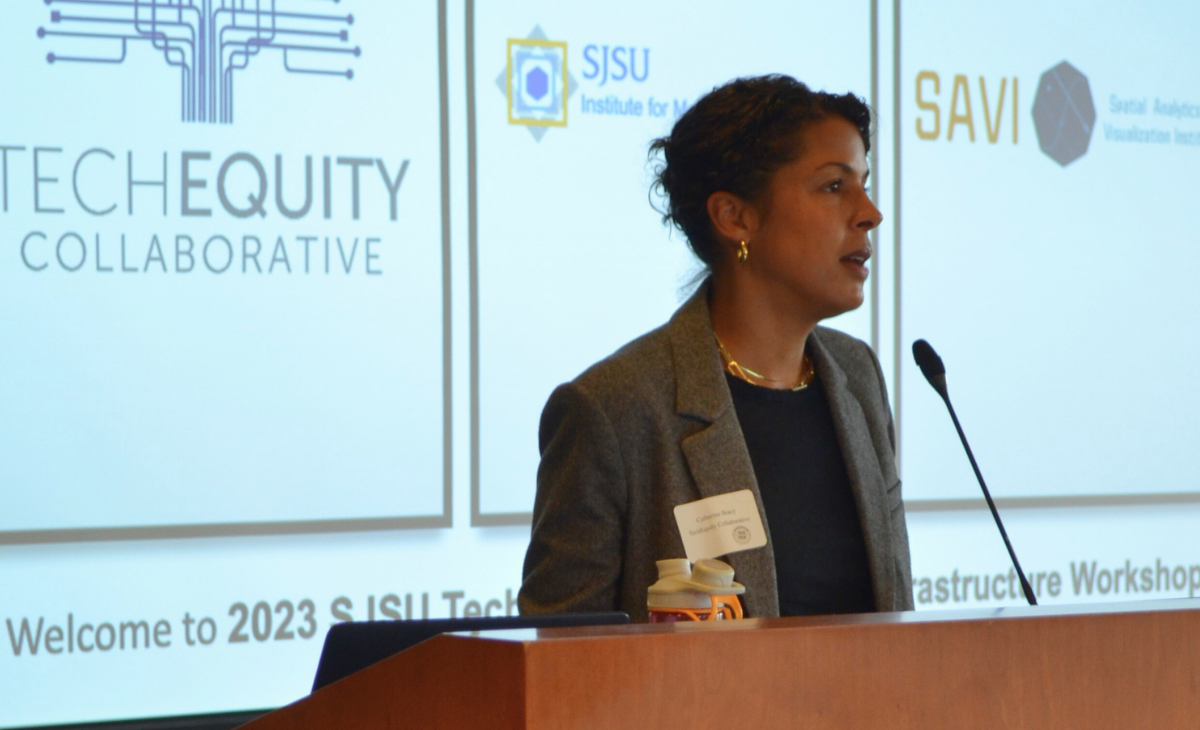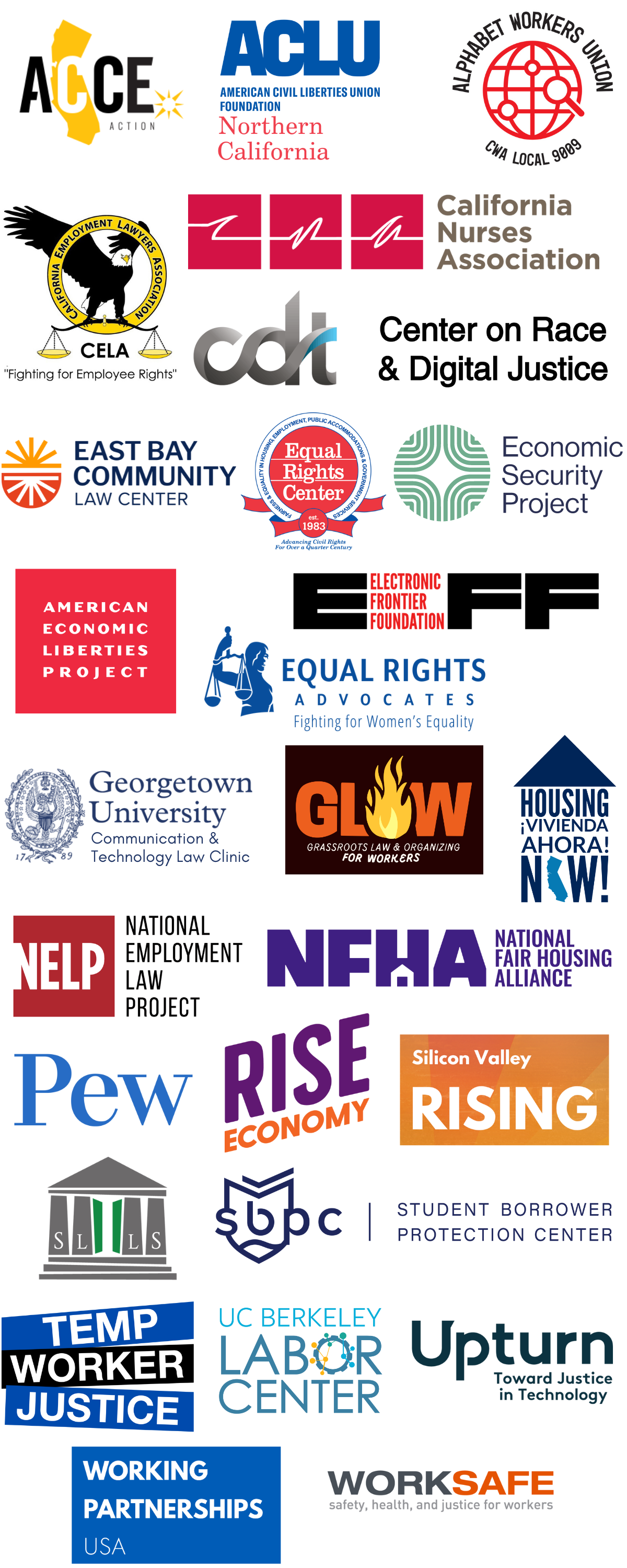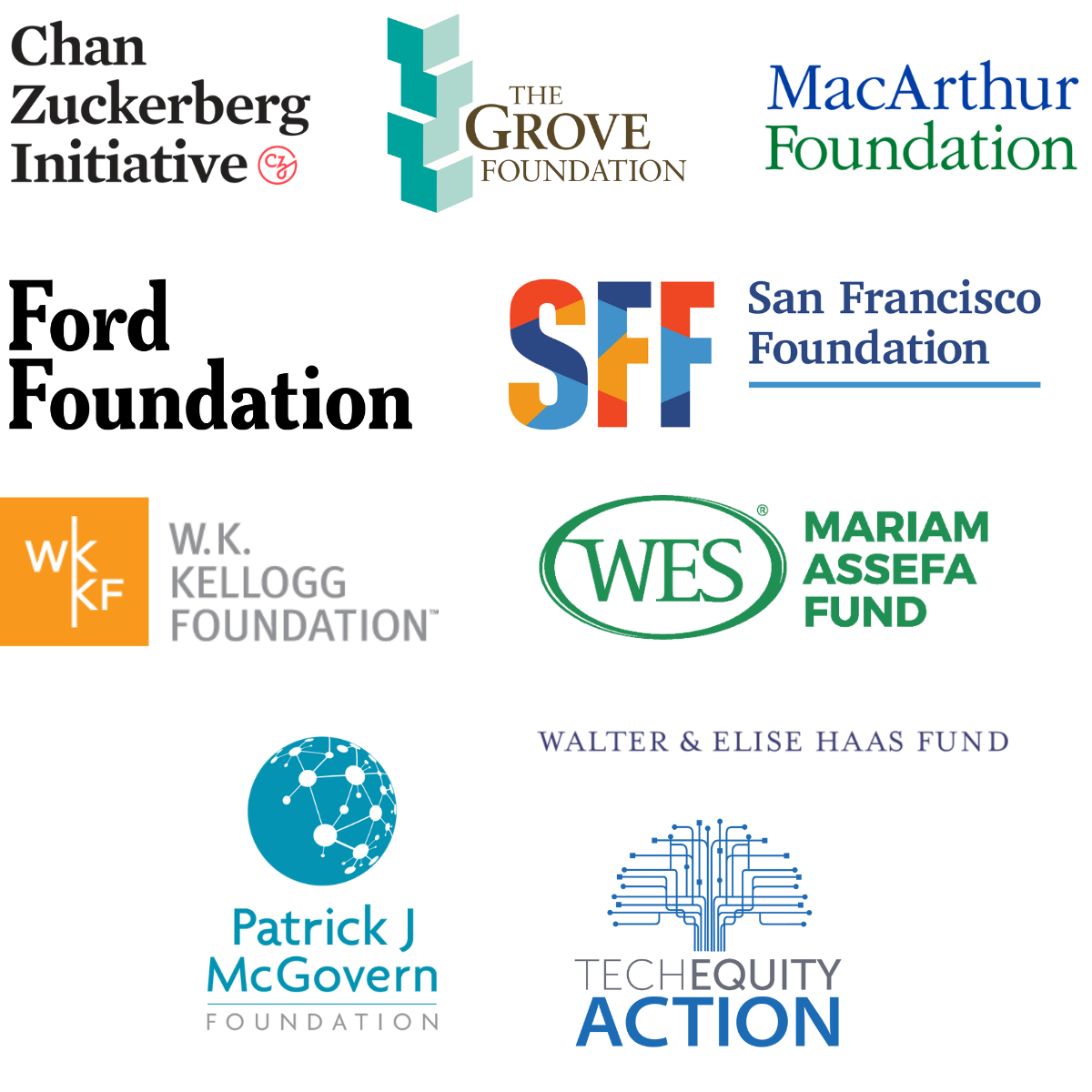
2023 Annual Report
Letter from Catherine Bracy, our CEO and Co-Founder
In just one year, AI has dramatically shifted the tech landscape. Generative AI models like ChatGPT exploded onto the scene in 2023, making theoretical conversations about “the future of work” real in an instant. While AI has demonstrated potential for addressing some of the greatest challenges facing humankind, its development and deployment come with significant risks. Automation and algorithms have the potential to enhance the human experience, making us more prosperous and unlocking human potential—but only if we ensure that the people who are most affected by it have a say in its use.
For TechEquity, 2023 was a year to reorient our work to address the impacts of this game-changing technology on our economy. Much of that meant amplifying work we were already doing in our Contract Worker Disparity Project and the Tech, Bias, and Housing Initiative. But we also began engaging in the national conversation around AI in ways that were new for us.

WHO WE ARE

We envision a world where the tech industry is responsible for building widespread economic prosperity, and is held accountable for the economic harms it creates in our communities.
We raise public consciousness about economic equity issues that result from the tech industry’s products and practices and advocate for change that ensures tech’s evolution benefits everyone.
HOW WE WORK
We educate the public on tech and economic equity, advocate for bold public policy, and develop equitable corporate practices that improve conditions for workers and products for everyone.
To achieve our vision of a world where tech is responsible for creating widespread economic prosperity, and is accountable for its harms, we:

Education + Research
We investigate inequities in and around tech that may have gone unnoticed and share those findings with policymakers, the industry, and the public.

Policy + Regulation
We create policy grounded in impacted people’s experiences so we can redistribute power, mitigate harm, and move the entire tech industry to action.

Implementation + Enforcement
We know that any law is only as good as its implementation; once policy is passed, we work with regulators and everyday people alike to explore how we can strengthen their impact.

“My story as a contract worker who has been sidelined is not uncommon—but it is often unnoticed. Our stories are powerful and can create real change; I’m glad to work with TechEquity to share my story with decision-makers that can materially improve contract working conditions.”
David Jones-Krause, former Google contract worker and member of Alphabet Workers Union
WHAT WE DID
We came together with workers and advocates to deepen our understanding of economic justice issues and advocate for a better tech economy. We uncovered inequities, championed critical legislation, and developed tools to ensure that good policy actually works.

Advocated for National Guardrails on AI
Given the growing role of automated systems and artificial intelligence in determining economic opportunity, and the potential scale of generative AI’s impact, we need policymakers, advocates, and technologists to establish clear guardrails before it’s too late.
This past year we’ve weighed in on the national conversation around AI. We partnered with advocates across the country to write letters to Congress, Biden, and more to ensure the needs of workers and renters are centered in the forthcoming regulation of automation, algorithms, and AI. When President Biden issued the Executive Order on Safe, Secure, and Trustworthy AI, we knew these collective efforts did not go unnoticed. What it misses, however, are protections for the people working within the AI supply chain—in the US and globally—who develop, train, and moderate the tools and products that are rapidly becoming a critical element of our economy and society. That’s why we partnered with Foxglove UK to highlight the human cost of AI across the world in the Stanford Social Innovation Review.
Campaigned for Contract Workers’ Rights
When Twitter suddenly fired thousands of its contract workers without notice, we realized that the realities for tech workers have shifted dramatically—we need updated layoff protections to meet the needs of workers today. We championed the Protect Laid-Off Workers Act, which would have protected contract workers in the event of layoffs, extended the WARN Act notice from 60 to 75 days, and ensured that no workers’ safety net is tied up in severance negotiations.
While AB 1356 didn’t pass the Governor’s desk, what we built in the process will have an impact for years to come. We grew a community of contract workers, some of whom became vocal champions of the bill. We strengthened our statewide and national coalitions of labor advocates, unions, and experts to advocate for much-needed protections. We created an online course to give values-aligned corporate actors the tools they need to adopt responsible contracting practices. And we changed the public conversation about contract work through articles, interviews, and op-eds in publications like NPR, Harvard Business Review, Washington Post, and more.


“The Protect Laid-Off Workers Act was a vision for what layoff protections should be, and TechEquity was instrumental in its journey to the Governor’s desk. I know they’ll be a valued partner in the continued work to make adequate layoff protections a reality for all Californian workers.”
CA State Assemblymember Matt Haney, Author of AB 1356

Investigated Tech’s Role in Housing Inequity
According to its proponents, Residential Proptech will make housing more accessible and affordable, and eliminate much of the discrimination embedded in America’s housing system. But Residential Proptech also has the potential to exacerbate the bias inherent in our housing system.
For the past year, we’ve been researching property tech’s impact on housing as part of our Tech, Bias, and Housing Initiative. We released a report summarizing this research, exploring how Proptech impacts renters and would-be homeowners, from tech bias in screening and alternative financing pitfalls to housing corporatization and venture capital pressures. We published an ethical practice guide for the Proptech industry to use as a blueprint towards equity. We also published a paper with the National Fair Housing Alliance to explore the state of privacy, technology, and data in housing.
Pushed for Caste Equity in California
Caste—whether in South Asia, Japan, Africa, or California—affects people’s ability to navigate, work, education, and housing—especially in tech. That’s why we partnered with Equality Labs to co-sponsor Ending Caste Discrimination in California, or SB 403. After a hard-earned victory in the Legislature, Governor Newsom vetoed the bill—however, he did affirm in his veto message that caste is covered under current protected categories in California. We hope that this declarative statement will allow those experiencing caste-based discrimination to be able to assert their rights and seek justice under the law.


“We knew bringing caste equity to the California legislature would be an uphill battle. TechEquity was an essential partner, helping us navigate the halls of power in Sacramento to near-victory. I’m grateful to have people in the tech world stand up for Dalits and other caste-affected people side-by-side with us.”
Thenmozhi Soundararajan, Founder and Executive Director of Equality Labs

Launched the Housing Data Initiative
We believe that data and technology—when developed and implemented with community needs at the center—can be powerful tools to ensure effective implementation of housing policy and help make housing a human right in California. That’s why we launched the Housing Data Initiative in 2023, to understand and close these housing policy gaps. To start, we brought together advocates, academics, government officials, funders, and tool builders for an in-person workshop and conversation about how we can build comprehensive and publicly accessible housing data. We’re taking the learnings from that symposium to launch the next phase of the project in 2024.
Raised Awareness About Tech + Economic Equity
Even as our educational programming remains fully remote, our community still managed to come together. We brought emerging economic equity issues to the public, bringing together experts and impacted people to deepen our collective understanding. We created spaces for thoughtful discussion about the realities of today—and how to make them better.


“Our paper on privacy, data, and tech in housing was no small feat—it was a boon to get TechEquity’s insights on both the tech industry and housing policy woven into it.”
Michael Akinwumi, Chief Responsible AI Officer at the National Fair Housing Alliance
WHAT’S ON TAP FOR 2024

Shaping AI to benefit, not harm, everyday people
We will bring together groups across issue areas and domains to share information, coalesce around a common set of principles and values, and drive an alternative vision for AI that centers those most impacted by the technology. This will be imbued throughout our existing initiatives as well as new projects to come.
Championing contract and temp workers’ rights
We’re coming into 2024 with an even fiercer commitment to enshrining contract worker rights into law. We’re working in coalition with established labor advocates to craft and pass legislation that empowers all workers, especially contract and temp workers who are left on the margins.


Making Proptech more equitable
We’re building on our groundbreaking research to illuminate the role of technology in the housing market, enforce fair housing laws, and encourage the Proptech industry to adopt practices that will ensure technology unwinds the injustices of the past rather than reinforces them.
Building tools for policy implementation
Building on the years of work TechEquity has done to establish a statewide rental registry in California, we will begin to knit together a comprehensive collection of all publicly available rental market data across the country. We will advocate for the creation of new data where it doesn’t exist. We will work with regulators and advocates to breathe life into the data, finding ways to use it to inform policymaking, enforce and strengthen housing rights, and advocate for the growth of affordable housing stock across the country.

Our Team
Thank you to our partners

Thank you to our board
Thank you to our advisors
Thank you to our major funders







































































